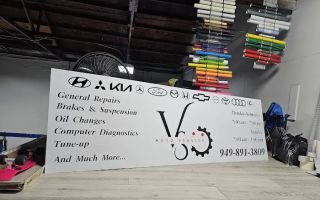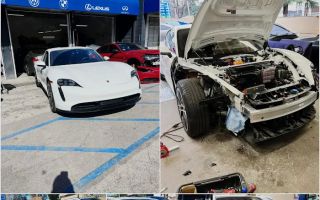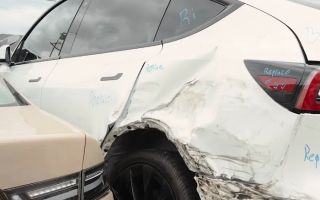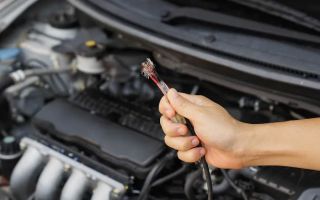Can You Repair a Flat Tire if the Sidewall is Damaged?
Flat tires can be a headache for any driver. The feeling of helplessness when you're stuck on the side of the road with a flat is something most of us have experienced at least once. However, not all flat tires are the same. While some can be easily repaired, others may require a full replacement. One of the most critical questions when it comes to tire repairs is whether or not you can fix a flat tire if the sidewall is damaged. Let me walk you through what you need to know about sidewall damage, repair possibilities, and when to seek help from towing or roadside assistance services.

MR. TIRE INC.
2078 New York Ave, Huntington Station, NY 11746, USA
1. Understanding Sidewall Damage in Tires
To begin, it's essential to understand what the sidewall of a tire is and why it's so critical to the tire's function. The sidewall is the part of the tire that connects the tread to the bead, which is the part of the tire that seals onto the rim. The sidewall is responsible for maintaining the air pressure in the tire and supporting the vehicle's weight. When the sidewall gets damaged, the tire's ability to perform properly can be compromised. But what happens when that sidewall is punctured or cut? Can the tire be repaired, or is it time to replace it?

MR. TIRE INC.
2078 New York Ave, Huntington Station, NY 11746, USA
1.1 The Importance of the Sidewall
The sidewall plays a critical role in the overall strength and structure of the tire. It provides stability, shock absorption, and supports the tire's performance when it makes contact with the road. Unlike the tread, which wears down over time and can be repaired or replaced, the sidewall is much more vulnerable. Damage to the sidewall could compromise the tire’s integrity, potentially leading to a blowout or other dangerous driving conditions.
1.2 How Sidewall Damage Happens
Sidewall damage can occur in several ways. Some of the most common causes of sidewall damage include:
- Hitting a curb or pothole at high speed
- Running over sharp objects like nails, glass, or debris
- General wear and tear from long-term use, especially if the tire is under-inflated
Any of these conditions can cause the sidewall to crack, cut, or bulge, which is a sign of serious damage. In such cases, the damage usually extends deep into the sidewall, compromising the tire's ability to hold air pressure properly.
2. Can You Repair Sidewall Damage?
Now, you might be wondering if sidewall damage is something that can be repaired. Unfortunately, the answer is no—at least, not in most cases. Sidewall damage is typically considered irreparable by professional standards. Here's why:
2.1 Structural Integrity Concerns
The primary concern with repairing sidewall damage is the loss of structural integrity. Unlike the tread area, which can be patched or plugged to restore functionality, the sidewall is responsible for the tire’s strength. Once it is compromised, the tire is no longer reliable. Even if a repair is attempted, the patch may not hold, and the tire could fail at high speeds, leading to a potentially dangerous situation on the road.
2.2 Tire Safety Standards
Tire repair specialists, including those who provide towing and roadside assistance services, follow strict safety guidelines. These guidelines often prohibit repairing sidewall damage because the repair would not restore the tire to its original safety standard. The risk of the tire bursting or experiencing other failures is just too high.
2.3 The Limitations of Patching or Plugging
Some people might consider patching or plugging the sidewall, but this is never a recommended solution. Even if a temporary fix is made, it won’t last, and you would still be driving with a compromised tire. In the long term, driving with a patched sidewall can lead to further damage, including potential blowouts that could endanger your safety and that of others on the road.
3. When Is It Time to Replace the Tire?
If you’ve discovered sidewall damage to your tire, it’s crucial to know when it’s time to replace it. A damaged sidewall often signals that the tire is no longer safe to drive on, and driving with such a tire can be extremely dangerous. If you notice any of the following signs, it’s time to replace the tire:
- A visible cut or puncture in the sidewall
- A bulge or bulging area on the sidewall
- Significant wear or cracking in the sidewall
It's best to replace a tire with sidewall damage rather than attempt to continue using it. A blown-out tire can cause serious accidents, and a damaged sidewall puts you at high risk of tire failure during driving. Getting a new tire installed is a safer and more reliable solution.
4. Real-Life Example: When Sidewall Damage Led to a Dangerous Situation
Let me share a quick story from my own experience to highlight how serious sidewall damage can be. A few months ago, I was driving down the highway when I felt a sudden jolt in the car. I pulled over and found that one of my tires had a visible bulge on the sidewall. I knew immediately that this was a serious issue and decided not to risk it. I called a roadside assistance company, and within 30 minutes, they arrived to replace the tire. The technician explained that driving on a damaged sidewall could have caused a blowout, especially if I had been driving at high speed. It was a reminder of how important it is to regularly check your tires for damage and seek professional help if you're in doubt.
5. How Roadside Assistance Can Help
In cases of sidewall damage or other tire emergencies, having access to reliable towing and roadside assistance services can make all the difference. When you’re on the road and experience a flat or damaged tire, a professional service can quickly assess the damage and provide the best solution. If a repair is not possible, they can tow your vehicle to a nearby tire shop where you can get a replacement tire.
For example, Rescue & Towing offers 24/7 roadside assistance for tire issues, including flat tires with sidewall damage. Their team is equipped to safely handle tire replacements and ensure you're not stranded on the side of the road for long.
6. Preventing Sidewall Damage in the Future
While you can’t always avoid accidents or road hazards, there are a few things you can do to reduce the risk of sidewall damage in the future:
- Regularly check your tire pressure to ensure it’s within the manufacturer’s recommended range. Under-inflated tires are more prone to damage.
- Avoid driving over potholes, curbs, or other obstacles at high speeds.
- Inspect your tires frequently for signs of wear, cuts, or bulges in the sidewalls.
By staying proactive, you can minimize the chances of sidewall damage and keep your tires in better condition for longer periods.
If you’ve experienced a flat tire or sidewall damage and need professional assistance, don’t hesitate to reach out to Rescue & Towing. Their fast and efficient towing and roadside assistance services can help you get back on the road safely.























